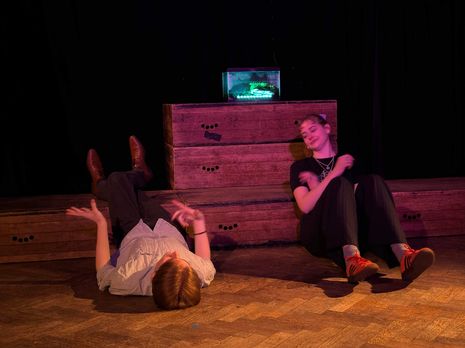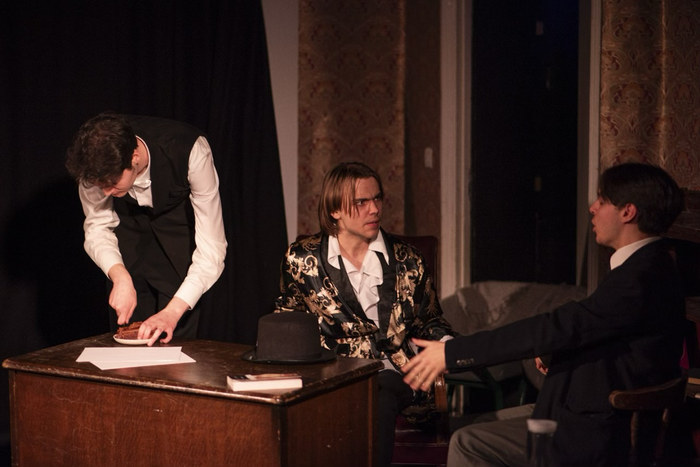Octopolis shatters convictions in its exploration of grief
This eclectic play challenges the boundaries of faith and superstition, and nature and nurture through philosophy and humour

Two actors and one imaginary octopus. That is all directors Alice Weatherley and Anna Peterson need to transform the Pembroke New Cellars – itself a kind of tank – into a space dripping with the best kind of tension. Professor George Grey (Rosalind Wippell) is a researcher known for her expertise in octopus intelligence, while Harry Giscard (Jacob Coughlan) is an anthropologist with an ambitious new hypothesis that threatens nothing short of Christian moral order. In between them, there is Frances, the octopus who dwells in a giant tank in the middle of George’s room on campus. Octopolis is, of course, only on a superficial level about an octopus; the humans are the real objects of study here, as they fight, pray, and as Harry says, try to ‘save the world.’
"Octopolis is, of course, only on a superficial level about an octopus; the humans are the real objects of study here”
Theological questions pleat the play on every facet, as do biological facts and worship of David Bowie. This eclecticism makes Octopolis delightful to watch, and although it takes concentration to understand the complex philosophy underpinning it, Wippell and Coughlan deliver their lines so expertly as to make the notions easy to grasp. The comedic timing of the pair was just as impeccable (‘Why do you have to be so fucking bourgeois about everything?’), and what seemed like particularly enthusiastic jokes about a Director of Studies were met with much laughter by the audience. Above all, the humour provided much-needed relief from the more emotionally taxing scenes that dominate the majority of Octopolis, and although some exchanges might have been curtailed to make it more digestible, the cast and crew juggled its gravity remarkably well on the whole.
‘I’m here to ascertain whether your octopus believes in God,’ Harry tells Geroge soon after his arrival, and the play does not back down from sharing with us the implications of such a question. In short, Octopolis wields huge symbolic power. Although scientists, the characters deal essentially in metaphysics when they challenge the boundaries between faith and superstition, nature and nurture, life and death.
“This is a play that relies exclusively on its actors”
The ‘inter-species shared experience’ as they call it turns out to be not nearly as black and white as either of them anticipate, rendering belief and ritual all the more irrational. ‘That’s a prayer, George,’ insists Harry in one scene. ‘A prayer to your late husband. The great crab king.’ It’s absurd, but then again, much of life is.
This is a play that relies exclusively on its actors. There is nothing for them to hide behind: no props, very little scenery, and only the occasional spotlight for dramatic effect. Everything rests on the dialogue, the delivery of raw, unobstructed emotion. Wippell and Coughlan were simply astonishing in that way, carrying, as they did, the bulk of the play on their backs. Perhaps the costumes could have been a little more thoughtful and the dance sequences a little less awkward, but by God does it move. Ever wondered what the colour of grief is? Go watch Octopolis to find out.
 News / SU reluctantly registers controversial women’s soc18 December 2025
News / SU reluctantly registers controversial women’s soc18 December 2025 Features / Should I stay or should I go? Cambridge students and alumni reflect on how their memories stay with them15 December 2025
Features / Should I stay or should I go? Cambridge students and alumni reflect on how their memories stay with them15 December 2025 News / Dons warn PM about Vet School closure16 December 2025
News / Dons warn PM about Vet School closure16 December 2025 News / Cambridge study finds students learn better with notes than AI13 December 2025
News / Cambridge study finds students learn better with notes than AI13 December 2025 News / Uni registers controversial new women’s society28 November 2025
News / Uni registers controversial new women’s society28 November 2025










